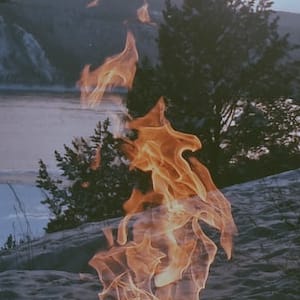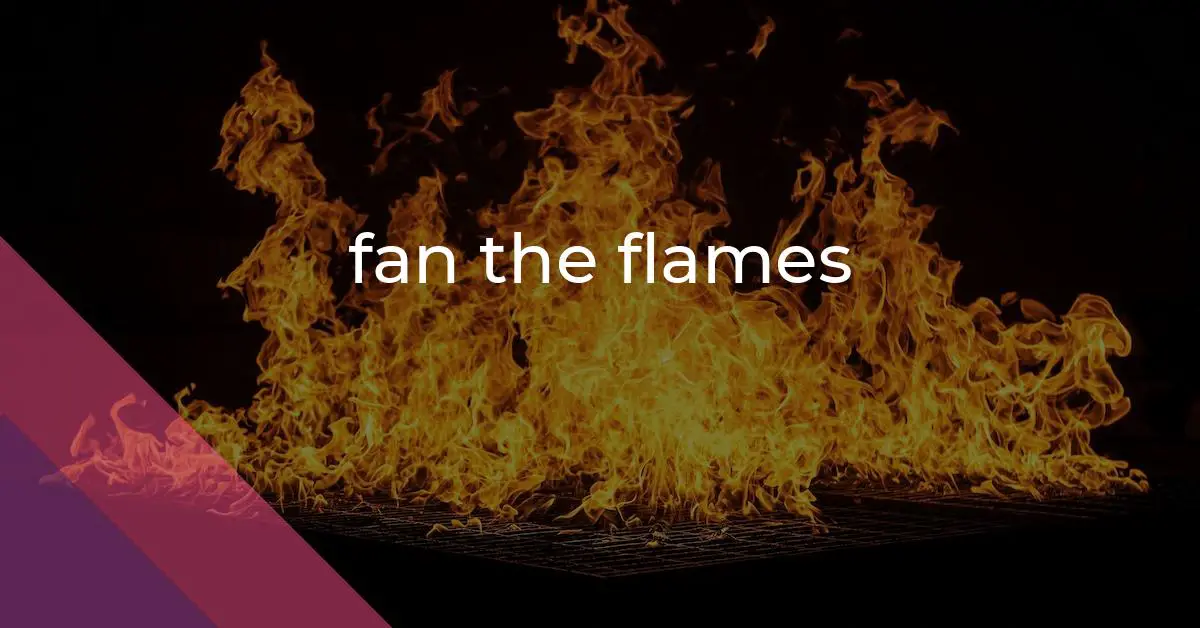fan the flames: Idiom Meaning and Origin
What does ‘fan the flames’ mean?
"Fan the flames" means to intentionally make a situation or conflict worse by increasing hostility or inciting more intense emotions.

Idiom Explorer
The idiom "pour fuel on the fire" means to worsen a situation or make a problem even more intense or volatile by saying or doing something that aggravates it further.
The idiom "kindle-fire" means to ignite or arouse strong emotions or passions within someone or a situation.
To "keep the home fires burning" means to maintain a sense of stability and comfort in one's home or family life, particularly during challenging or uncertain times.
The idiom "hold someone's feet to the fire" means to put pressure on someone or hold them accountable for their actions or words.
The idiom "hit the fan" is used to describe a situation where something goes terribly wrong or chaotic, often as a result of a secret or scandal being revealed. It implies a sudden and explosive response to the situation.
An idiom that means to gain momentum or build up force, often used in the context of a person or group gathering energy or enthusiasm for a task or goal.
The idiom "go up in flames" means to fail or be destroyed in a dramatic or disastrous way.
The idiom "go down in flames" means to suffer a significant and public failure or defeat. It is often used to describe a situation where all efforts or plans end in disaster or are unsuccessful.
The idiom "get someone's dander up" means to make someone angry or agitated. It implies that something has provoked a person to the point of becoming heated or irritated.
Deciphering Intense Emotion
When examining the idiom "fan the flames," it is important to understand its meaning and origins. This phrase refers to an action that worsens a situation, often in a negative way. It is a commonly used idiomatic expression in the United States, and it has become part of everyday language.
One possible origin of this idiom can be traced back to the literal act of fanning flames. When a fire needs more oxygen to grow, fanning the flames helps fuel the fire and make it burn more intensely. This idea of fanning as a supportive action can be applied to other aspects of life, where individuals can contribute to the escalation or worsening of a situation.
In a figurative sense, "fan the flames" describes the act of agitating or making a conflict, problem, or controversy worse. This idiom suggests a deliberate and conscious effort to intensify a situation, rather than working towards a resolution. It indicates the active involvement of an individual or group in inflaming a matter, often by adding fuel to an existing fire.
Furthermore, the idiom "fan the flames" is commonly used in discussions of social and political issues, where individuals may incite divisions, provoke hostility, or ignite outrage. The phrase suggests a deliberate attempt to heighten tensions, often through the spreading of inflammatory rhetoric or engaging in provocative actions. The result is usually the escalation of conflicts, worsening of disagreements, or deepening of divisions.
Another idiomatic expression related to "fan the flames" is "pour fuel on the fire." This phrase emphasizes the action of adding something that makes a situation even worse. It implies that someone is intentionally exacerbating a problem or conflict by providing more negativity or controversy.
Similarly, "add fuel to the fire" is another related idiom that conveys the act of contributing to the intensity or worsening of a situation. It suggests that someone is making a problem or conflict even more severe by their actions or words.
In addition, there is the idiom "hit the fan" which relates to the consequences or backlash that can occur when a situation becomes chaotic, intense, or out of control. It implies that a situation has reached a tipping point where the negative aspects are being uncovered or becoming impossible to ignore. This idiom is related to "fan the flames" as it implies that fanning the flames can lead to a point where everything unravels and becomes chaotic.
Lastly, "draw fire" is another idiom related to "fan the flames." This phrase suggests that someone is attracting negative attention or criticism. It implies that by engaging in provocative or controversial actions, an individual or group is intentionally inviting criticism or anger from others. This idiomatic expression reflects the idea that fanning the flames can lead to the person or group becoming the target of the negativity they have stirred up.
The idiom "fan the flames" carries a negative connotation as it implies worsening a situation or intensifying conflict. It is important to recognize the potential harm that can result from actions intended to fan the flames, as they can perpetuate hostilities, deepen divisions, and hinder efforts towards resolution. Reflecting on this idiom serves as a reminder of the importance of seeking constructive solutions and avoiding actions that only serve to exacerbate challenges, both personally and collectively.
Example usage
Examples of how the idiom "fan the flames" can be used in a sentence:
- He tried to fan the flames of the argument by raising his voice and making provocative statements.
- The politician's speech was seen as an attempt to fan the flames of division among the people.
- The rumors circulating on social media only served to fan the flames of fear and panic.
"Fan the flames" is often used figuratively to describe actions or words that intensify or exacerbate a situation, particularly a negative or controversial one. It implies adding fuel to a fire, making it grow and spread. In the examples provided, the phrase is used to describe someone's attempt to escalate an argument, a politician's effort to deepen division among people, and the impact of rumors on people's anxiety levels. In all cases, "fan the flames" suggests an action that incites or amplifies a contentious or heated atmosphere.
More "Exaggeration" idioms



